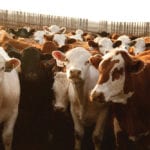Beef check-off rates in B.C., Alberta and Saskatchewan will change to align with the seller's home province as of August 1, regardless of where the sale takes place.

Beef check-off rules to change in Alberta, Saskatchewan and B.C.
Aug. 1 changes will keep check-off dollars in seller’s home province

Alberta Beef Producers work towards being fully funded
Alberta Beef Producers sees non-refundable checkoff as long-term goal, but says it will take a cautious approach
Reading Time: 4 minutes Alberta Beef Producers hope to work towards becoming a fully-funded industry, which would mean making checkoff dollars non-refundable. Brad Dubeau, Alberta Beef Producers general manager, said they will take their time getting there, but it is a priority.

SaskCanola, SaskFlax merge offices, management
Groups will maintain separate governing boards, levies
Sasskatchewan’s canola and flax development commissions are consolidating their management, staff and office space under one roof. SaskCanola and SaskFlax said Wednesday their new “management collaboration” will translate to efficiencies for both commissions with “a full staff complement to support both boards.” Both organizations will now operate out of the current SaskCanola office at Innovation […] Read more

Merged Manitoba crop groups qualify for checkoffs
Manitoba Crop Alliance also names top brass
The new unit formed from the merger of five Manitoba crop commodity organizations is set to begin collecting checkoffs for its founding groups’ crops, starting Aug. 1. The Manitoba Crop Alliance (MCA) announced Monday it now has its designation under the provincial Agricultural Producers’ Organization Funding Act. The designation allows the new organization to collect […] Read more

Tax credits available for cereal checkoffs
Reading Time: < 1 minute Cereal farmers who pay Alberta Wheat’s and Alberta Barley’s checkoff are eligible for Scientific Research & Experimental Development Fund (SR&ED) tax credits. For wheat, the tax credit is 31 per cent while for barley, it’s 13 per cent. The federal program encourages R&D investment by giving claimants tax credits for their expenditures on eligible R&D […] Read more

Ontario beef checkoff to rise by $1.50
Ontario beef farmers have approved an increase of $1.50 in checkoff per animal to fund an ambitious industry-wide marketing effort for Ontario beef. Producers at the Beef Farmers of Ontario (BFO) annual meeting in Mississauga on Wednesday voted 87 per cent in favour of the plan. A similar plan was rejected at last year’s annual […] Read more

What’s in the beef research pipeline?
Reading Time: < 1 minute An increase in the national beef checkoff (from $1 to $2.50 per head in most provinces) has increased the Beef Cattle Research Council’s research budget to about 75 cents per head (versus 15 cents previously). Under the new Beef Science Cluster III program — which runs until March 31, 2023 — $21 million will go […] Read more

Non-refundable checkoff defeated, cattle group moving on
ABP leaders say they wish more had cast ballots but the issue is now in the rear-view mirror
Reading Time: 3 minutes *[UPDATED: Dec. 20, 2018] He’s disappointed to have lost the vote and wishes more cattle producers had cast a ballot, but the chair of Alberta Beef Producers says it’s now time to “move forward.” There were 1,874 votes cast in a plebiscite to make the $2 provincial beef checkoff non-refundable — with 51.3 per cent […] Read more

Alberta cattle producers vote to keep refundable checkoff
Preliminary results in Alberta beef producers’ service charge plebiscite put a slim majority in favour of keeping their checkoff refundable. Out of 1,874 votes cast, 962 votes, or 51.3 per cent, fell in favour of a refundable service charge model, with 908 for a non-refundable model and four ballots spoiled, according to the preliminary figures […] Read more

Beef checkoff plebiscite extended until Nov. 27
Reading Time: < 1 minute The plebiscite on making the $2-per-head provincial cattle checkoff non-refundable has been extended by two weeks, and so voting will continue until Nov. 27. The Alberta Agricultural Products Marketing Council “recognized that the terrible weather during September and early October left many producers far behind on their harvest and other fall work in the fields […] Read more

